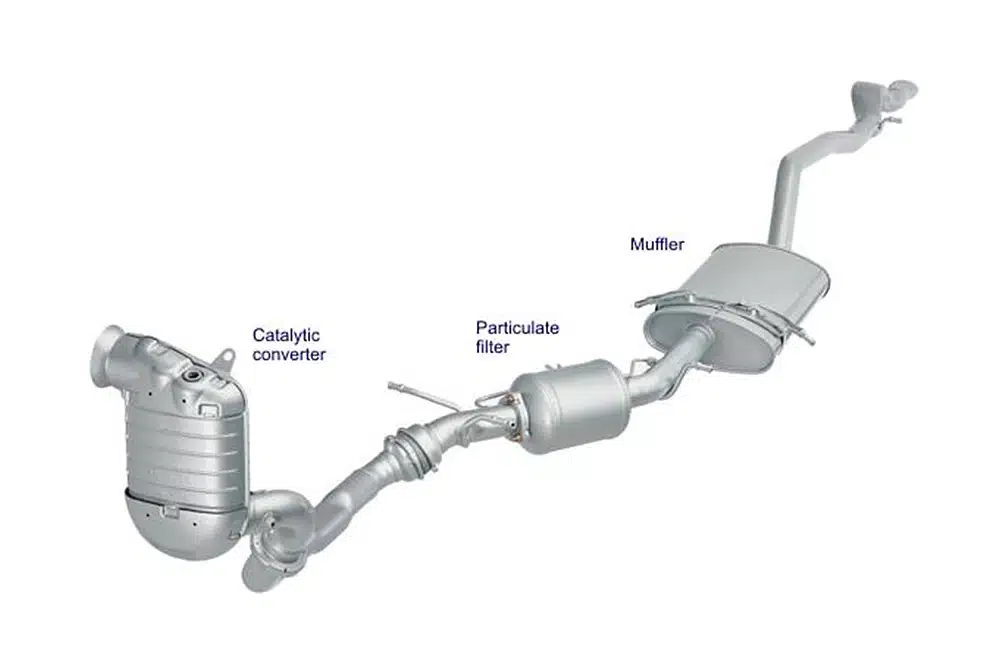The cooling system of an OOTR truck is a vital component responsible for maintaining optimal engine temperature and preventing overheating. The cooling system ensures that the engine
More
May 17, 2024 9:31 am

The exhaust system, in long haul trucks, plays a role in serving functions such as controlling emissions decreasing noise levels, and optimizing engine performance. Let’s explore why OTR truck exhaust systems are important and how they work.
Emission Control: Long haul trucks typically run on diesel engines that emit pollutants like nitrogen oxides (NOx) particulate matter (PM) and hydrocarbons (HC). Components like converters, diesel particulate filters (DPF), and selective catalytic reduction (SCR) systems are integrated into the exhaust system to reduce these emissions thus lessening the truck’s impact on the environment.
Compliance with Regulations: Governments and environmental agencies have emission standards to combat air pollution. OTR trucks must adhere to these regulations to operate legally. The exhaust systems ensure that the truck’s emissions meet or surpass the required standards ensuring compliance and minimizing the chance of facing penalties or fines.
Noise Reduction: OTR trucks produce noise due to their engines. Mufflers or silencers are included in the exhaust system to muffle and diminish noise levels creating a quieter environment, for both the driver and nearby residents.
For more information and articles on truck driver life on the road click this link truck driver maintenance tips
Collection of Exhaust Gases: The system that manages the exhaust gathers and directs the gases produced by the engine toward the back of the vehicle. It includes parts like manifolds, pipes, and connectors to carry these gases.
Emission Control: Within the exhaust system are devices for emission control such as converters, DPFs, and SCR systems. Catalytic converters convert gases into harmful ones through chemical reactions. DPFs. Eliminate particulate matter while SCR systems use a catalyst to change emissions into nitrogen and water vapor.
Optimizing Pressure: A significant function of the exhaust system is to regulate backpressure, for improving engine performance. Designed exhaust systems help maintain backpressure levels that impact engine efficiency, power output, and fuel consumption.
Read more about OTR truck driver maintenance tips-related news:
Tire Maintenance Magic: Enhance Performance & Lifespan
Truck Engine Overheating: Common Culprits and Fixes
Winter Preparations for Your Semi Truck – 8 Essential Tips
Rig-Juvenation: Spring Maintenance Tips for Truckers
Truck Heater Problems: Diagnosis and Maintenance Tips
Truck Drivers Guide: Driving in Winter Weather Conditions
Regular Checks: Periodic inspections are necessary for OTR truck exhaust systems to detect leaks, damage, or corrosion. Components of the exhaust system should be visually inspected for signs of wear and tear.
Diagnosing Emission Systems: OTR trucks come with onboard systems that monitor emission control component performance. Regular diagnostic assessments can help in identifying and addressing any issues.
Component Replacement: As time passes certain parts of the exhaust system may. Get blocked. It’s crucial to swap out any faulty parts, like converters or DPFs as per the manufacturer’s guidelines.
Keeping up with fuel and oil care: Opting for high-quality fuel and regularly changing the engine oil and filters can help extend the lifespan and ensure the operation of the exhaust system.
Seek maintenance: When it comes to repairs or replacements of exhaust components in OTR trucks it’s best to rely on skilled technicians who specialize in OTR truck exhaust systems. Professional servicing guarantees the operation of the exhaust system while staying compliant with regulations.
OTR truck exhaust systems play a role in controlling emissions reducing noise and optimizing engine performance. Upkeep, thorough inspections, and adherence to standards are essential, for maintaining their functionality and reducing the environmental impact of these trucks.
For more information and articles from the trucking industry, follow us on Facebook or subscribe to our Truck Driver News newsletter.
The cooling system of an OOTR truck is a vital component responsible for maintaining optimal engine temperature and preventing overheating. The cooling system ensures that the engine
MorePrepare Your Rig for Winter: 8 Essential Tips for Truck Drivers. Stay safe on the road and minimize downtime with these winterization strategies.
MoreBrake systems play a pivotal role in ensuring the safety and reliability of over the road driving. As a critical component, regular maintenance and care are essential
MoreLARAMIE, Wyo. — In a significant development for the transportation industry, Federal Highway Administrator Shailen Bhatt joined federal, state, and
MoreRyder System and Kodiak Robotics Partner to Create an Autonomous Truckport - Their First Port, Established in Houston, is Set
MoreVolvo Has Reconceptualized Their Flagship Class 8 VNL Tractor. Discover How Their New Models Have Been Designed with Future Tech
MoreWith a passion for craftsmanship and a commitment to excellence, Fleenor Bros. has firmly established itself as a prominent player
MoreIn a significant push for transparency and fairness within the trucking industry, the Owner-Operator Independent Drivers Association (OOIDA) is rallying
More